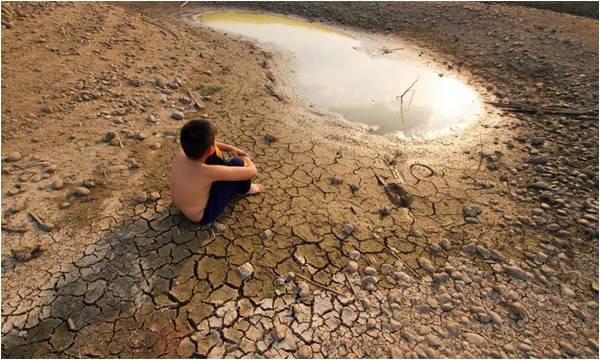
Climate change is one of the biggest issues all nations of this world are collectively facing. Developing countries like Pakistan are vulnerable in view of their inability to cope with weather-related disasters such as flash floods etc, but climate change has serious consequences for affluent countries as well, in the shape of erratic weather patterns, hurricanes and heavy flooding of settled areas.
Pakistan is likely to be affected by extreme weather events, both in the short and long term. Regretfully, Pakistan ranks number seven on a list of 10 countries which were adversely affected by climate change, with a death toll of 523.1 lives per year, that is, 10,462 lives lost in 20 years and economic losses worth $3.8 billion — equivalent to 0.605 per cent of the gross domestic product (GDP) in the 20-year period. The super floods of 2010 placed Pakistan on the top slot among the countries most affected by climate change as it lost $25.3 billion and 5.4 per cent of the GDP, according to Germanwatch.
As a developing country, with abject poverty and limited resources, climate change has the potential to become a destructive problem for Pakistan. The saddest part is that even though Pakistan is classified as one of the most vulnerable countries with respect to climate change, it is not a major emitter of greenhouse gasses. In fact, Pakistan’s emission levels are negligible, standing at a mere 0.7 percent of the total world emissions.
Pakistan faces many challenges in the backdrop of worsening climatic conditions. In the economic sphere, climate change poses a formidable threat. Water availability, over the years, has been decreasing for the agriculture sector. Since Pakistan is heavily dependent on the agriculture sector for its foreign earnings, any damage to this sector would present a problem of far reaching consequences. If agriculture production drops significantly, Pakistan’s trade balance, already volatile and highly unfavourable, would worsen.
Aggravated climate change will severely deteriorate human health. Warmer climate will result in the increase of many water and air and borne diseases. Additionally, deteriorating food security because of lower agriculture production will increase malnutrition, subsequently decreasing immunity to diseases. Furthermore, health facilities may be too expensive for them to avail.
Hence, it is necessary to engage local communities (both urban and rural) to understand climate change, mitigate against it, and adapt natural solutions using citizen and civic movements. Thus, the government should prioritise increasing awareness amongst citizens. For Pakistan, there is no escape from this, either with or without the assistance of international organisations and funds created for the purpose. In order to survive climate change, necessary steps must be undertaken. To this end, the government and the people of Pakistan need to enhance cooperation in various fields, and the international community needs to be engaged. If these efforts are made wholeheartedly, Pakistan can successfully weather the storm, and leave a brighter future for its coming generations.
The writer is a student of Atta Shad Degree College, Turbat
Pakistan is likely to be affected by extreme weather events, both in the short and long term. Regretfully, Pakistan ranks number seven on a list of 10 countries which were adversely affected by climate change, with a death toll of 523.1 lives per year, that is, 10,462 lives lost in 20 years and economic losses worth $3.8 billion — equivalent to 0.605 per cent of the gross domestic product (GDP) in the 20-year period. The super floods of 2010 placed Pakistan on the top slot among the countries most affected by climate change as it lost $25.3 billion and 5.4 per cent of the GDP, according to Germanwatch.
As a developing country, with abject poverty and limited resources, climate change has the potential to become a destructive problem for Pakistan. The saddest part is that even though Pakistan is classified as one of the most vulnerable countries with respect to climate change, it is not a major emitter of greenhouse gasses. In fact, Pakistan’s emission levels are negligible, standing at a mere 0.7 percent of the total world emissions.
Pakistan faces many challenges in the backdrop of worsening climatic conditions. In the economic sphere, climate change poses a formidable threat. Water availability, over the years, has been decreasing for the agriculture sector. Since Pakistan is heavily dependent on the agriculture sector for its foreign earnings, any damage to this sector would present a problem of far reaching consequences. If agriculture production drops significantly, Pakistan’s trade balance, already volatile and highly unfavourable, would worsen.
Aggravated climate change will severely deteriorate human health. Warmer climate will result in the increase of many water and air and borne diseases. Additionally, deteriorating food security because of lower agriculture production will increase malnutrition, subsequently decreasing immunity to diseases. Furthermore, health facilities may be too expensive for them to avail.
Hence, it is necessary to engage local communities (both urban and rural) to understand climate change, mitigate against it, and adapt natural solutions using citizen and civic movements. Thus, the government should prioritise increasing awareness amongst citizens. For Pakistan, there is no escape from this, either with or without the assistance of international organisations and funds created for the purpose. In order to survive climate change, necessary steps must be undertaken. To this end, the government and the people of Pakistan need to enhance cooperation in various fields, and the international community needs to be engaged. If these efforts are made wholeheartedly, Pakistan can successfully weather the storm, and leave a brighter future for its coming generations.
The writer is a student of Atta Shad Degree College, Turbat

